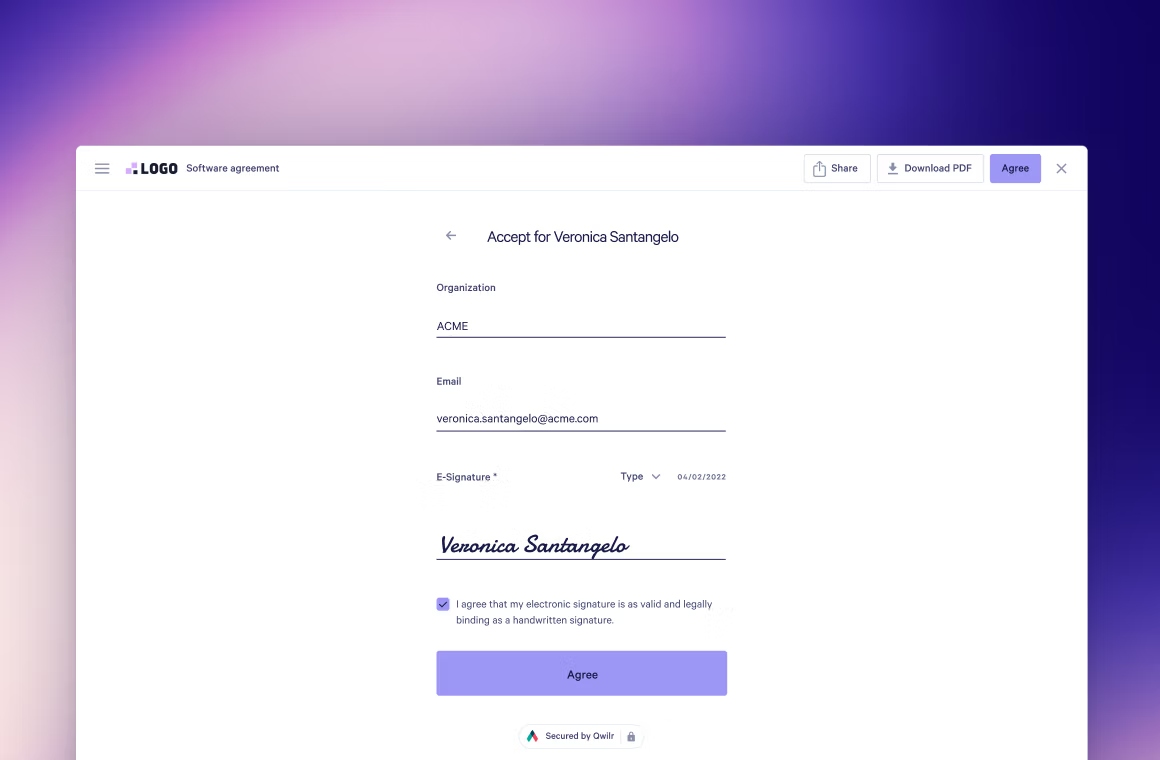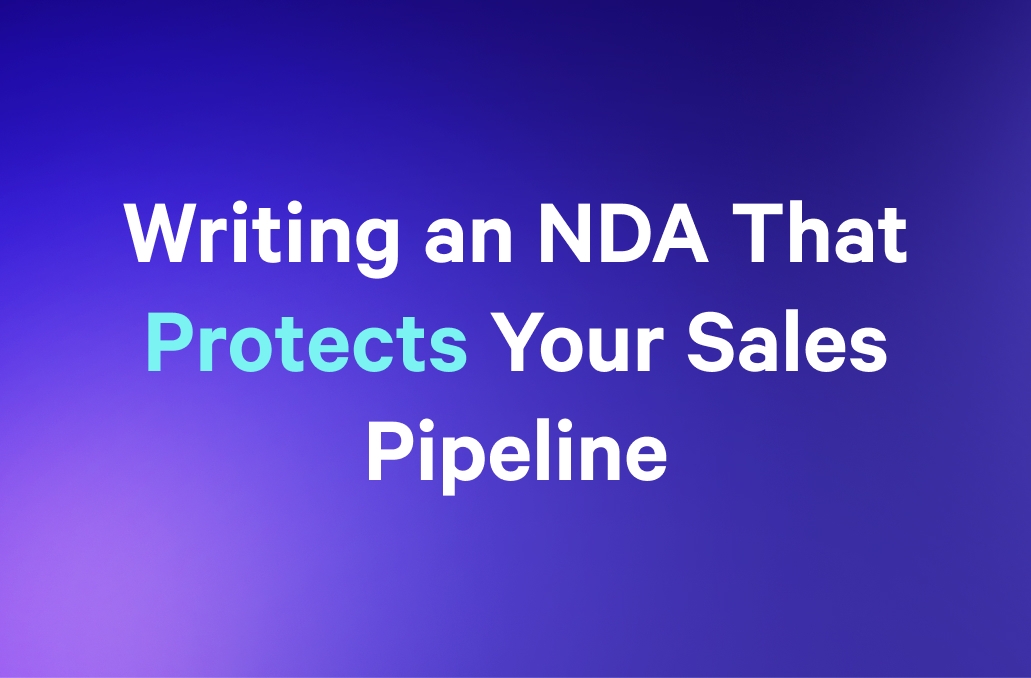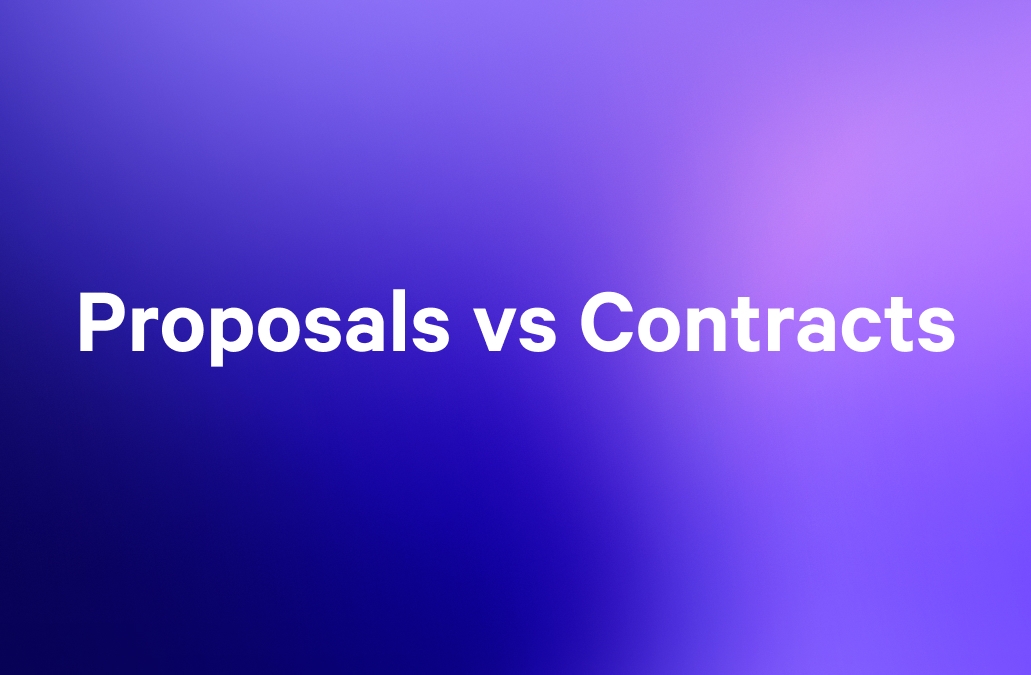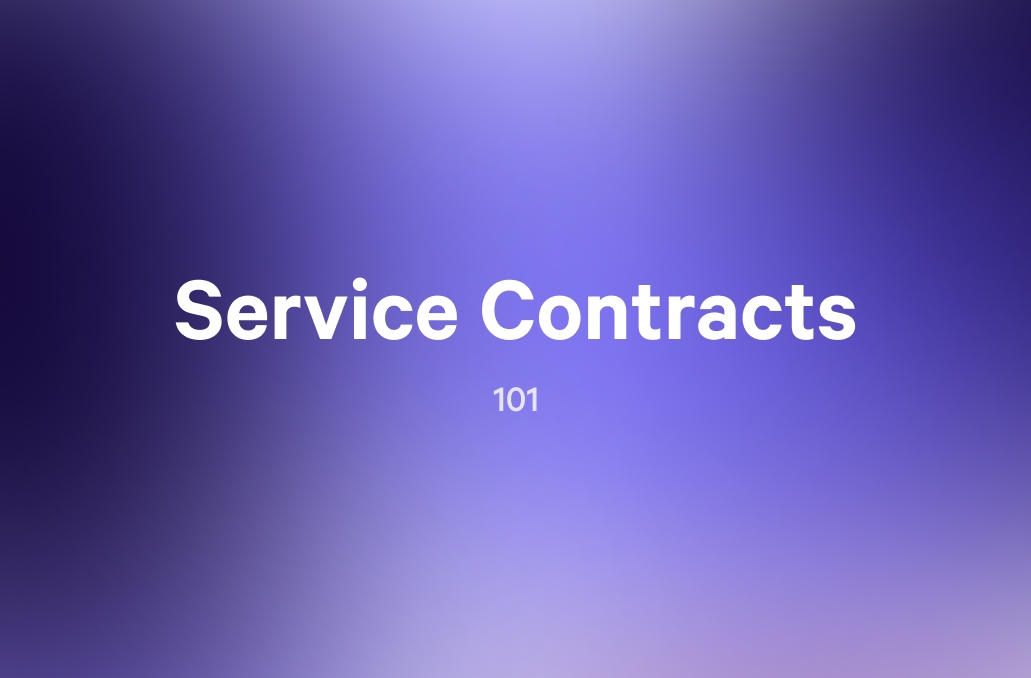Putting together a solid sales contract can feel like a time-consuming hassle, especially when it comes to getting every last detail right.
Many sales reps find themselves caught up in drafting, negotiating, and making sure nothing slips through the cracks, which can lead to delays and costly mistakes.
Luckily, with tools like Qwilr, creating a sales contract that’s both professional and straightforward doesn’t have to be such a chore.
Let’s walk through the essentials of crafting a reliable sales contract that keeps clients confident and your sales process moving smoothly.
Key takeaways
- A sales contract is an official document signed by two parties agreeing to the terms of a sale of goods or services.
- A sales contract should include the names of both parties, a description of the goods or services, and payment details, at the very least.
- A solid sales contract will address customer needs and expectations first and foremost, and be sure to use clear, concise language, offer a review period, and make the signing process easy.
- Qwilr offers a sales contract template that includes pre-designed spaces for every essential part of the agreement, including the option to e-sign and make payments.
What is a sales contract?
A sales contract is an official document that states the terms of a sales agreement. It typically includes the names of both parties, the price and payment terms, and a description of the products or services.
It can also include extra sections like a good faith statement — essentially the modern, digital version of a handshake. You might also see any contingencies around the sale, like consequences for early termination and a policy around confidentiality.
Read next: How to write a retainer agreement
What is the purpose of a sales contract?
The sales contract is the end result of a strong sales conversation. It allows both parties to come to the table during a sale and feel good about the terms of a new relationship. It protects both parties’ interests and creates a formal event of the agreement.
Perhaps most importantly, it offers clarity and transparency around the terms of the agreement. This way, both parties will have in writing what the expectations and terms are. There can be no confusion around who is bringing what to the table.
When do you need a sales contract?
There are many occasions when drafting and signing a sales contract would be a good idea. These include:
- To create goodwill and good faith
- The transfer of ownership of any product or service over $500
- When the contract will last for a period of time
- When there are complex components to be considered and can be referred back to
- To release liability
- To provide legal backup and protection
- To protect an investment
- To provide a statement of value
Types of sales contracts
- Asset sales: A sales contract for any assets would include the transfer of ownership of an asset from one party to another. This can include real estate, a vehicle, jewelry, or even intangibles like stocks or funds.
- Intellectual property sales: An intellectual property sale involves any creation of the mind, like music, literature, art, symbols, and inventions. When you transfer the ownership of intellectual property, you can either give up any claim at all or set a limited term or condition on the sale.
- Sales agreements: Sales agreements are what we typically think of when we talk about business. When two businesses or a business and a client agree to work together, they will typically sign a sales agreement.
- Master service contracts: The master service contract is a kind of sales agreement, but it speaks to the long-term relationship between the two parties.
- Renewal contract: The renewal contract acts as an extension of the master service contract. It will last for a shorter term with agreed-upon services and prices included.
- Employment contract: An employment contract is the sale of the employee’s labor for an agreed-upon salary or wage.
- Terms of service: Terms of service agreements are what you’ll typically see between a service provider, like a cell phone company, and a client.
- Statements of work: Statements of work are what you’ll usually see between a contractor and a client, outlining the agreed-upon work to be done and the price.
Psst, read next: How to write a real estate contract
Essential elements to include
Every sales contract will typically include some essential elements that make it a sales contract. These include:
- Involved parties: Of course, you want to have the full names, business or personal, of both parties involved.
- Product/service description: This section will describe what exactly the product being sold/bought looks like, if there is any damage, distinguishing features, etc. For a service, it will outline what will be provided, in detail and by whom.
- Quote and payment terms: The quote is the total price point for the products or services, and the payment terms describe how much and how often the payment will be made.
- Delivery terms: If a product is being delivered, this section will provide a date, time, and how the delivery will be made.
- Warranties: If a product is sold, especially if it’s brand new, there will often be a warranty that guarantees the continuing good condition of the product. It will often offer regular service or even a refund if the product is found wanting.
- Liability and indemnity: A sales contract will often state explicitly who is liable, or responsible for the goods or service. In addition, it will provide some kind of insurance to protect the asset.
- Confidentiality: The confidentiality section of a sales contract will discuss any agreements around press releases, data sharing, and privacy policies.
- Termination clause: The termination clause describes how one or both parties can terminate the relationship and/or get a refund.
- Additional provisions: Sometimes, there will be an additional section with provisions for either party, some extra loophole or term not typically included in a sales contract.
Tips for creating a solid sales contract
You’ve asked your challenger sales questions, built a strong rapport, and convinced the client to close the sales. Now, to write a solid contract that makes both parties feel good about the relationship, the terms, and the agreement, you can follow these tips:
Determine customer needs and expectations
You should never go into a sales contract without clearly understanding what your client expects from this relationship.
Long before you begin drafting the contract, make sure you have at least a couple of conversations with your client about what will happen, what you’re promising, and what their end of the deal is.
Repeat all of this information back to your client in the form of a sales proposal to get their full buy-in in the form of a verbal and written agreement. Then, write it all down in the contract.
Read next: Contract vs Proposal
Use a template or tool to create and manage contracts
Unless, of course, you don’t have to write it all down because you have a template. Fortunately, these days, there’s a template for virtually everything, especially sales contracts. Qwilr offers a sales contract template that has space for all the essential parts of a contract, plus options for e-signing, embedded payments, document analytics, and more.
You can create your own content, or you can use the language provided by Qwilr based on your industry, business, and the type of sale you’re closing.
Then, you can store the saved document, update it as needed, and create renewals that will pull information from your master service contract. So, you’ll have everything you need, all in one place.
Use clear and concise language
One of the elements that people like the least about sales contracts, or any contract at all, is the possibility of vague language or loopholes that can leave the client vulnerable to exploitation.
One of the most powerful proactive sales moves you can make in this situation is to be clear, direct, and concise in the language of the sales contract. This shows you’re listening to the client, you’ve learned about their needs, and you’re adding value to their lives.
A clearly written, easy-to-understand contract that shows your customers you’re here to help will engage them and keep them seeing you as a partner rather than a “slick” salesman trying to make a buck.
Read next: How to write an addendum
Outline payment terms explicitly
You’ve already discussed pricing and payment terms with the client. Make sure that you include precisely and only that information in the sales contract.
You can plug in figures and organize terms so your client can see what you’ve agreed on at a glance. It’s a great way to continue to build trust.Get feedback from sales and legal teams
Anyone entering into a sales contract should always have legal counsel look it over before sending it out or signing it. You can ensure you’re not leaving yourself vulnerable to legal action in the future or exposing your company to any kind of negative repercussions.
Also, be sure to have your sales team look at the contract before you send it out to get their full agreement and buy-in. They’ll be able to guide you through terms and language that feel off, particularly if you’re dealing with an enterprise sale, which could turn out to be a large, long-term partnership that affects your whole sales team.
Read next: Addendums versus amendments in contracts
Include a review period
Your sales contract should offer your client a period of time to read the contract, consult with their own legal counsel, and ask for any changes. The general time period for an agreement is four to eight weeks. This allows for negotiations and edits to be made before the final signing date. It also allows for any client objections, and your responses to them.
Provide prospects with interactive quotes and pricing tables in your contract proposal alongside plain-text agreements.
Streamline signing process
When your client is ready to sign, make it easy for them! The built-in e-signing capability with Qwilr’s sales contract template allows your client to identify themselves and provide their legally binding signature, closing the deal without a bunch of fuss or a delayed waiting period to get everyone in the same room. This shows your client that you’re willing and able to keep up with their dynamic needs.
Psst: Find out how to create a digital signature here!

Gather legally compliant e-signatures from multiple people in a single Qwilr page.
Sales contract template
Qwilr’s sales contract template is the ideal document for all of your sales contracts. You’ll create consistency across the board for your master service contracts and renewals, and for all of your customers. You can embed your own logo, colors, and brand identifiers, like fonts and styles, and easily manage contracts.
You can customize the template as much or as little as you like, and we’ll be here to guide you along the way.
Our pre-designed sections will help you outline the scope of work, payment terms, delivery schedule, and more. You can personalize it with your own language, and you can adjust or modify sections however you see fit. You’ll also be able to embed any links, videos, Looms, GIFs, and more to any page you want.
Your client can even accept the first payment and future costs right through a payment link embedded in the document.
Pssst: Need something a little more formal? With Qwilr's Agreement feature you can include plain-text, print-friendly agreements alongside your dynamic content.
Simplify sales contracts with Qwilr
Ready to get your first sales contract started with Qwilr? We’re here to help your sales process run smoothly, help you build strong relationships with your clients, and save you the time and headache of having to draft your own sales contract or use a template that’s hard to work with.
The Qwilr sales contract has everything you could possibly need to close a solid deal. Contact us today for a free trial, and see for yourself.
About the author

Brendan Connaughton|Head of Growth Marketing
Brendan heads up growth marketing and demand generation at Qwilr, overseeing performance marketing, SEO, and lifecycle initiatives. Brendan has been instrumental in developing go-to-market functions for a number of high-growth startups and challenger brands.



